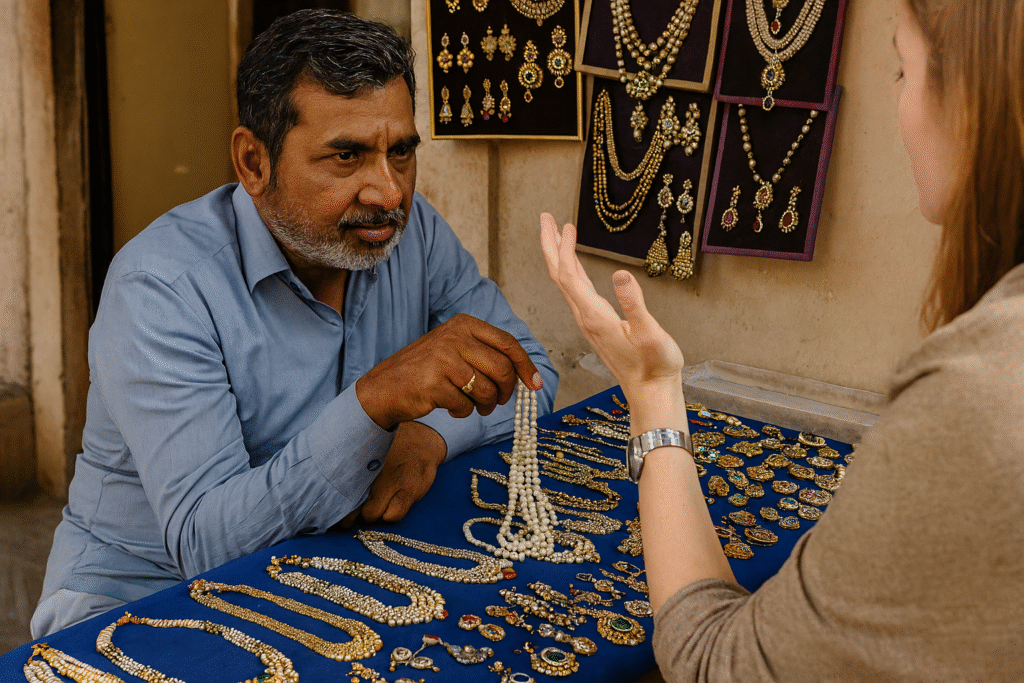Bargaining for jewelry in Jaipur is part of the shopping experience. If you don’t haggle, you risk overpaying. If you haggle too hard, you risk offending the seller. The key is finding a respectful middle ground.
This guide shows you how to negotiate effectively in Jaipur’s famous jewelry bazaars, from Johari Bazaar to Tripolia, while saving money and maintaining goodwill.
Step 1: Know the Market Before You Bargain
Tourists who skip this step often end up paying 20–40% more than locals.
Research average jewelry prices online.
Ask locals what fair rates are for silver, gold, or gemstone jewelry.
👉 “Check average prices online before you enter the market. Also read our guide on Understanding BIS Hallmark: What It Means for Your Jewellery to identify authentic pieces.”
Step 2: Start Low, Stay Polite
- Begin with an offer 30–40% lower than the asking price.
- Keep a friendly tone and smile.
- The key is to show interest while leaving room for the seller to meet you halfway.
👉 If you are considering gold purchases, our post 24K, 22K, 18K: What Every Malayali Gold Buyer Must Know helps you compare purity levels.
Step 3: Use Silence and Walking Away
- If the seller resists, pause before countering.
- Walking away politely often brings a better offer.
- Case study: A traveler in Jaipur saved ₹4,500 on a silver necklace using this tactic.
👉 “Travelers who also want to avoid diamond scams can check Certified Stones Only: How to Avoid Overpaying for Diamonds.
Step 4: Recognize When the Price is Fair
- Some gemstone jewelry has less room for bargaining.
- If the seller stands firm, it often means the item is close to its real value.
- Building rapport now may lead to discounts later.
👉 Learn more about here: Jaipur Tourism Official Website
Q&A
Q: Is bargaining for jewelry in Jaipur rude?
A: No. Sellers expect it, but they value politeness.
Q: What’s a realistic discount?
A: Aim for 20–30%, depending on the material.
Q: How do I know when to stop haggling?
A: If the seller insists, the price is likely fair for the quality.
Quotable Insights
- “The key to bargaining for jewelry in Jaipur is knowing when to smile, when to pause, and when to walk away.”
- “Research shows polite haggling saves tourists up to 30% in Jaipur jewelry markets.”
👉 See our Gold Buying Checklist for Malayalis.
Small Luxury Hotels FAQ
Introduction
This small luxury hotels FAQ answers common questions about boutique stays. It explains definitions, differences with large chains, and which services to expect. In addition, it covers family options, sustainability, and tips on finding the right property.
What defines a small luxury hotel?
- Fewer than 100 rooms.
- Personalized attention and privacy.
- Strong links to local design.
- Locations in unique urban or rural areas.
As a result, travelers often choose them for a more intimate experience. Moreover, their distinctive style sets them apart from standardized hotels.
Why choose a small luxury hotel?
Personal service
Staff remember guest details, therefore creating a sense of familiarity.
Calm spaces
Unlike large hotels, these properties feel quieter, so you can relax more easily.
Local culture
For example, menus highlight regional produce, and interiors reflect local crafts.
In addition, many guests return because the experience feels authentic.
How do small luxury hotels differ from large chains?
Guest experience
Small hotels provide tailored attention, while chains rely on uniform systems.
Property identity
Each boutique hotel has its own theme. On the other hand, large chains repeat formats worldwide.
Dining approach
Menus change seasonally and locally. Therefore, guests enjoy fresh variety instead of standard global menus.
Are small luxury hotels only for leisure stays?
Business features
- Lounges double as meeting rooms.
- Private dining options support work dinners.
Digital needs
- Fast Wi-Fi supports remote work.
- Quiet spaces help concentration.
Because of these advantages, small luxury hotels appeal to both business and leisure travelers.
What services can you expect?
- Concierge services for tours and dining.
- Fine dining menus with seasonal ingredients.
- Spa and wellness treatments.
- Added extras like minibars and welcome gifts.
Moreover, services shift depending on location. For example, a city hotel might offer cultural tours, while a rural retreat offers farm experiences.
Are small luxury hotels family-friendly?
Options for families
- Connecting rooms for parents and children.
- Child-friendly amenities such as menus or games.
Adults-only stays
- Some properties focus on privacy.
- Guests find peaceful, child-free environments.
Therefore, always check booking policies, because each hotel sets its own approach.
Do these hotels support sustainability?
Sourcing and dining
Farm-to-table meals reduce transport impact. In addition, guests enjoy fresher produce.
Environmental focus
Plastic use is restricted, while refillable bottles are encouraged. Smart energy systems reduce wastage.
Local involvement
Hotels support the community by hiring regionally. As a result, growth extends beyond the property.
How do you find the right small luxury hotel?
Define needs
Decide if food, spa, culture, or privacy is your top priority.
Check guest feedback
For example, repeat reviews about service often signal consistency.
Compare value
Packages may include meals, transfers, or early check-in. Therefore, higher prices can still deliver stronger value.
Are small luxury hotels worth the price?
Value of service
Guests pay for attention, comfort, and privacy. Moreover, experiences feel tailored and unique.
Extras add value
Some hotels include exclusive experiences or benefits. Finally, weigh these extras against nightly rates.
As a result, many travelers feel these hotels justify their price when quality matters most.

